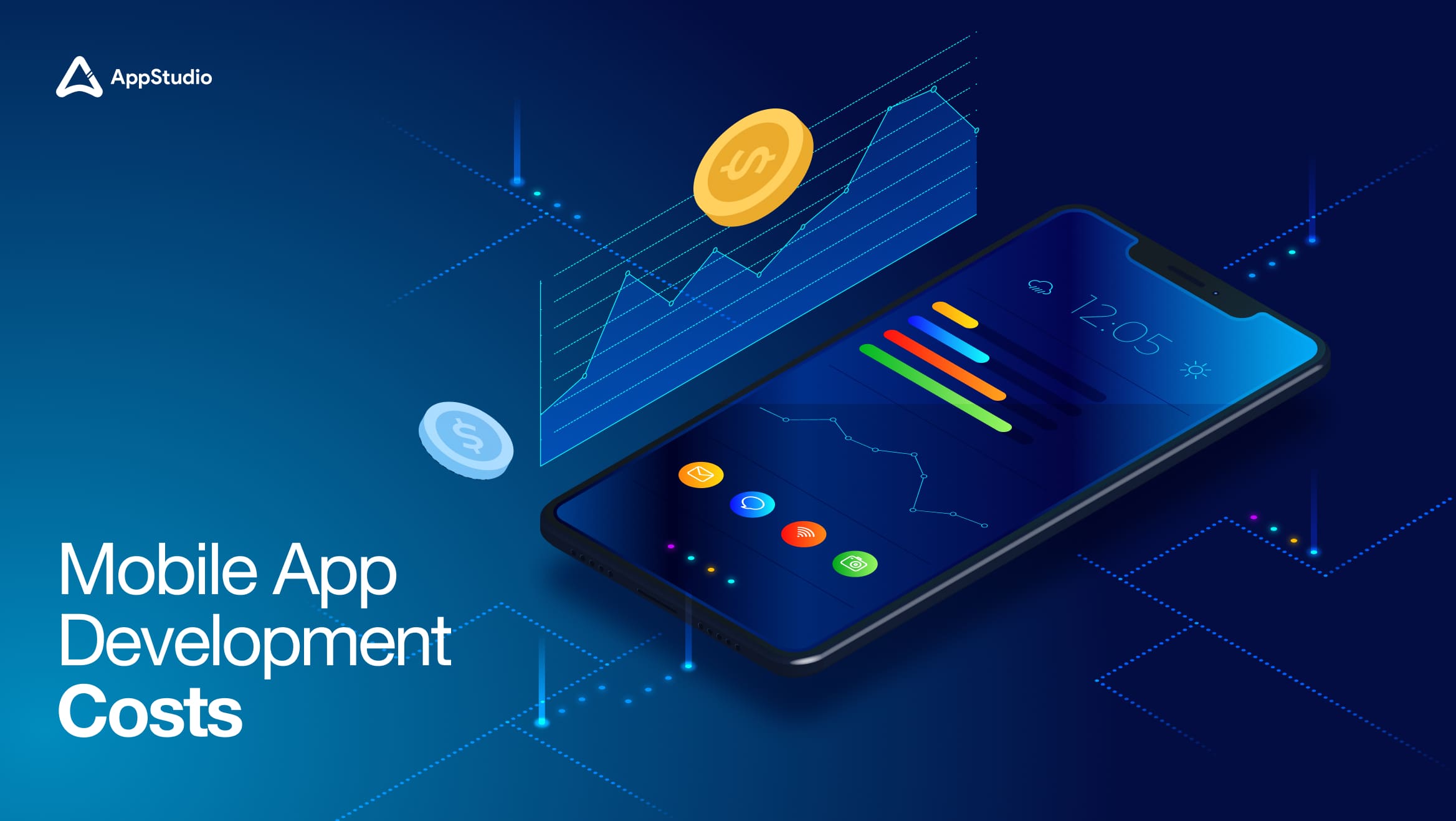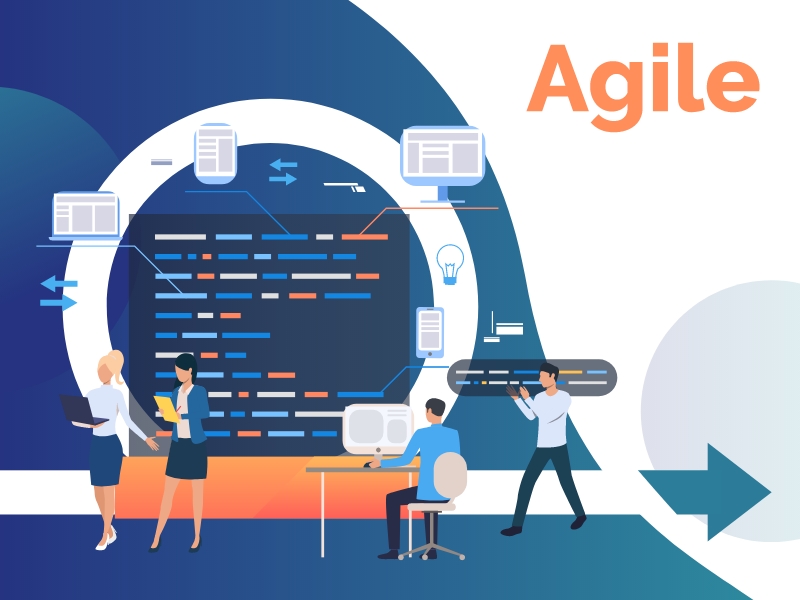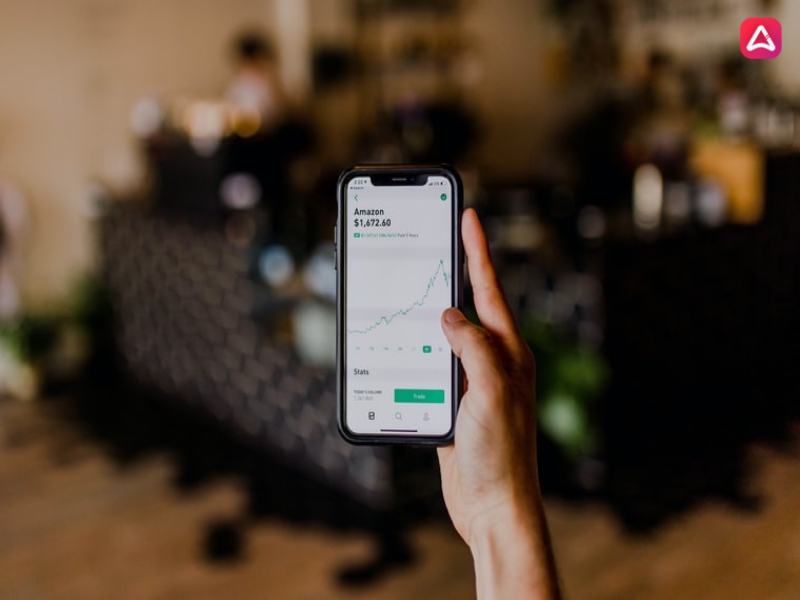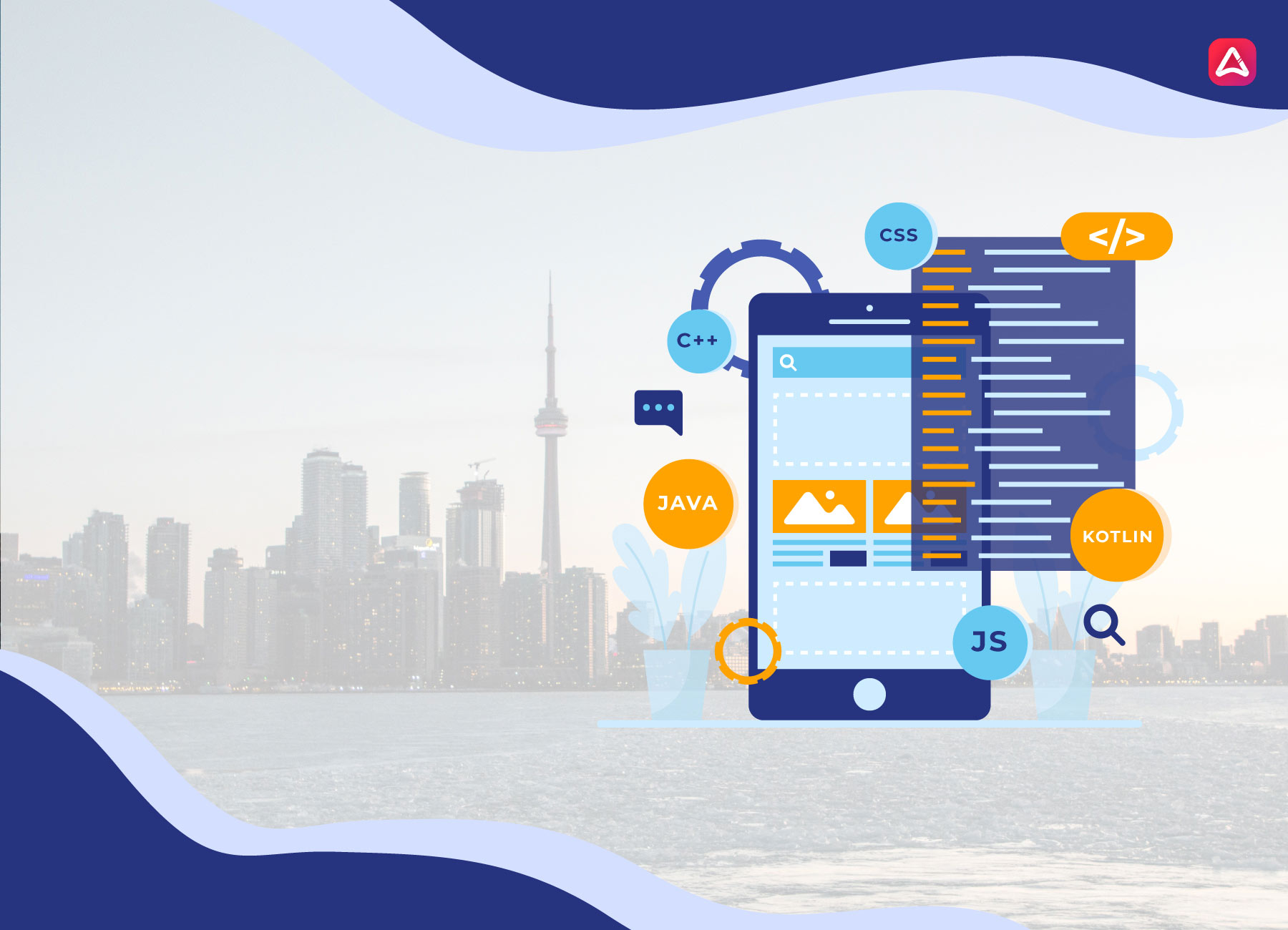In our exploration of today’s technology landscape, we’ve discovered an undeniable reality: there really is an app for almost every aspect of our lives. As the world transitions towards a more digital framework and places a higher priority on sustainability within business operations, the role of developing mobile apps is becoming increasingly crucial.
To illustrate this point, let’s look at some compelling statistics. According to BusinessofApps, the Google Play Store now offers a staggering 3.3 million Android apps, while the Apple App Store is not far behind with about 2.2 million apps. Furthermore, a report from Grand View Research predicts that the mobile app market’s revenue, spanning various industries, is expected to reach approximately $567.19 billion by the year 2030.
This significant increase in app development underscores a robust investment trend among digital businesses in mobile app creation. Whether you’re here to understand the costs of developing an app in 2025, pondering whether to take a DIY route or considering seeking professional advice, you’ve come to the right place.
In this blog, we’ve provided all the essential information to guide you through the decision-making process regarding your mobile app development cost. By exploring the strategic importance of mobile apps in achieving business sustainability and operational efficiency, you can better assess how to proceed with developing your own app to meet your business objectives and technological needs.
The cost of developing an app can vary widely based on several factors, including the app’s complexity and the development team’s geographic location. The cost to build an app also includes considerations such as ongoing maintenance and updates to ensure the app remains functional and secure over time.
Let’s dive right into the topic of mobile app development costs for 2025.
Understanding the Average Cost to Develop a Mobile App
Estimating the average cost to develop a mobile app can vary widely, typically ranging from $25,000 to $150,000. For highly customized or complex apps, it may even surpass $300,000. The term ‘tentative’ is used here because the cost to create a mobile app is influenced by numerous factors, including the app’s complexity, the array of features and functionalities, and the chosen development approach.
Fear not, as we provide a comprehensive breakdown of all the critical factors that impact the cost of building an app.
Understanding these variables will help you calculate the cost of creating an app more accurately. This calculation involves estimating the total number of hours required for each development stage and multiplying these hours by the billable rates of the involved resources.
Related reading: Top 5 Mobile App Development Technologies to Develop Faster
Mobile App Development Cost Breakdown
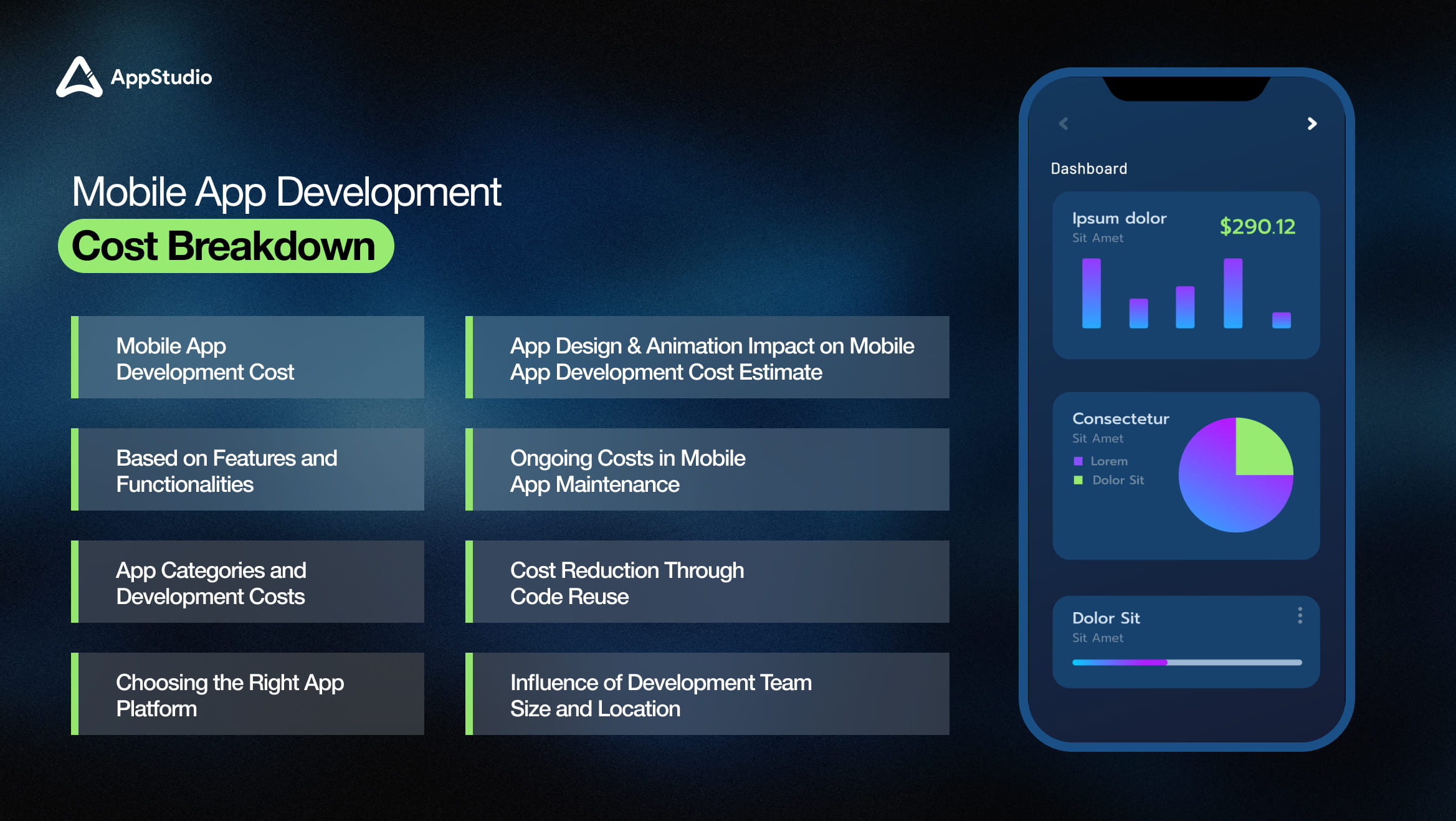
When clients approach an application development company for consultation about their app idea, they often lack an understanding of the development process and the associated costs. While they may have a clear vision of their requirements and functionalities, this alone does not suffice for an accurate cost estimation.
It’s essential to recognize that the initial cost quoted by the agency is merely the beginning. The app development cost breakdown involves a much more intricate process. To grasp the full scope of what app development entails financially, thorough research and an in-depth understanding of the app’s dynamics are required.
Here’s a simplified mobile app development cost breakdown focusing on five fundamental elements:
- Functionalities of the app – The purposes the product serves and the needs it fulfills for the customers.
- Complexity of app features – Whether it’s a comprehensive telemedicine app development or a straightforward to-do list, the complexity of features directly influences the development complexity and, by extension, the app development price.
- Targeted devices and platforms – Deciding between native and cross-platform development affects whether the app will cater to a single platform or multiple platforms.
- Maintenance plan – Ongoing technical support post-deployment is crucial to ensure the app functions smoothly and continues improving.
- Third-party integration – Incorporating services such as location sharing or payment systems can also raise the app development price due to additional complexities.
Mobile App Development Cost by Complexity
Let’s check how cost and complexity influence mobile app development:
- Simple apps: These apps feature basic user functionalities such as a login system, user profiles, a dashboard, and limited administrative controls. Developing a simple app ranges from $5,000 to $50,000. Typically, these apps require 2-3 months to develop and offer minimal viable product (MVP) functionality with basic user interfaces (UI).
- Moderately complex apps: With a price tag ranging from $50,000 to $120,000, these applications include more engaging features and monetization options. Beyond basic functionalities, they incorporate elements like social media integrations, payment gateways, audio/video streaming, and enhanced user privacy measures. The development timeline for these apps usually spans 3-9 months, and they feature sophisticated features and custom UI designs.
- Highly complex apps: These are priced between $100,000 and $300,000, often exceeding this range depending on the specifics. Integrated with cutting-edge technologies like augmented reality (AR), virtual reality (VR), artificial intelligence (AI), and machine learning, these apps also support multiple languages, boast advanced data handling capabilities, and much more. Such apps take over 10 months to develop, offering high-level advanced features and bespoke UI across two platforms.
This breakdown illustrates how mobile app development price can vary significantly based on the app’s complexity and the technologies employed.
Based on Features and Functionalities
Understanding mobile application development costs hinges significantly on the features and functionalities incorporated into your app. The foundational mobile app development price for your intended app type escalates as you add new features.
It’s wise to focus initially on essential features. Launching with a Minimum Viable Product (MVP), which includes only the basic functionalities, can significantly reduce costs and time while providing an excellent user experience. This strategy saves resources and gathers valuable feedback from early users.
Here’s a breakdown of the estimated budget and time needed for your app features:
- User Login
- Functions: Social media and email login, password recovery, logout
- Time: 30-42 hours
- Cost: $500 – $1,000
- Profile Completion
- Functions: Add basic info, photo, set region
- Time: 30-40 hours
- Cost: $900-$1,000
- Messaging
- Functions: Online/offline status, typing indicator, send media and documents, read/sent status
- Time: 170-180 hours
- Cost: $3,000-$5,000
- Push Notifications
- Functions: Send reminders and notifications to users
- Time: 25-32 hours
- Cost: $1,000 – $1,200
- Basic Admin Panel: User Management
- Functions: View, create, edit, and delete/block users
- Time: 66-90 hours
- Cost: $3,500-$4,000
Advanced feature integration and their impact on mobile application development cost:
- Payments
- Functions: View transaction history, check balances, add cards, and integrate with platforms like Paytm and PayPal.
- Time: 60-78 hours
- Cost: $2,500-$3,000
- Maps
- Functions: Detect location, set pickup and destination points
- Time: 100-120 hours
- Cost: $3,000-$4,000
- Calls
- Functions: Audio and video calls, contact list management
- Time: 300-400 hours
- Cost: $14,000-$15,000
App Categories and Development Costs
The cost to build a mobile app can vary significantly across different categories. Each category comes with its unique set of users, functionalities, and security needs, which influence the overall cost of creating a mobile app.
- E-commerce/M-Commerce apps: Platforms like Amazon and Wayfair lead this category due to their comprehensive feature sets that support real-time performance, manage millions of simultaneous users, and ensure robust security, thereby increasing the cost of building a mobile app in this sector.
- Social Networking apps: These apps often require third-party integrations and access to hardware functions such as cameras and audio recorders. Given their need to scale for millions of users, social media apps generally have higher development costs.
- On-demand apps: Even the simplest on-demand apps typically have three versions: one for users, one for service providers, and one for businesses. For example, Acti Drive utilizes IoT technology to provide a seamless driving experience, reflecting the specialized requirements of on-demand services.
- Hardware-dependent apps: IoT-based apps rely heavily on hardware for functions like data extraction and executing commands. An example is “Moo,” an eScooter app that represents the future of micro-mobility and necessitates significant hardware integration.
App Design & Animation Impact on Mobile App Development Cost Estimate
App design is a crucial element that influences the cost estimate of mobile app development. An engaging and user-friendly design is essential to encourage users to spend time within the app.
Regarding app design, there are generally two paths: Custom and Standard UI. Custom UI, which offers tailored aesthetic and functional features, is more complex and costly to develop than the more straightforward Standard UI.
Additional key components of mobile app design include wireframing and animation:
- Wireframing: Developers use tools like MARVEL, Balsamiq, and Photoshop to map out user experience features effectively, creating a blueprint for the app’s layout and functionality.
- Animation: Increasingly used to enhance user interaction, animation makes app elements more engaging and intuitive, especially in gaming and social media apps.
Mobile Application Development Cost Estimate Based on App Design:
- App Design Research
- Tasks: Market research, competitor analysis, trend analysis, selecting solutions based on niche
- Development Cost: $100-$350
- UX Design
- Tasks: Creating rough sketches, low and high-fidelity wireframes
- Development Time:
- Simple – 10-14 hours, Medium – 50-60 hours,
- Complex – 150+ hours
- Development Cost: $2,000-$8,000
- UI Design (Visuals)
- Tasks: Developing mood boards, UI mockup samples, and final UI mockups
- Development Time:
- Simple – 14-20 hours,
- Medium – 80-90 hours,
- Complex – 100+ hours
- Development Cost: $10,000-$40,000
- Branding
- Tasks: Creating brand identity, designing logos, icons, and social media assets
- Development Cost: $5,000-$20,000
- Animations and Illustrations
- Tasks: Visualizing user interactions and on-screen content
- Development Cost: $1,000-$20,000
Choosing the Right App Platform
Selecting the appropriate platform is a crucial step in mobile app development. Your choice will depend on your target audience and may include iOS, Android, web apps, or cross-platform applications. For startups on a tight budget, it’s advisable to start with one platform and then expand to others as resources allow.
Here’s a look at the most common app development platforms:
- Native App Platform (Android & iOS): iOS apps are primarily developed using Swift and Objective C, whereas Android apps are built with Java or Kotlin.
Estimated cost: $50,000 to $100,000
- Web App Platform: Progressive Web App development and other web applications offer a more cost-effective solution compared to native apps.
Estimated cost: $15,000 to $50,000.
- Cross-Platform: This approach allows for simultaneous iOS and Android development using a single codebase, reducing the effort and cost of app development. Popular tools include Flutter and React Native.
Estimated cost: $25,000 to $60,000
- Hybrid App Platform: Hybrid apps combine elements of both native and web apps. Installed like a native app, they operate within a web view, offering a versatile solution.
Estimated Cost: $10,000 to $150,000
Ongoing Costs in Mobile App Maintenance
The journey of a mobile app doesn’t end with its launch; it continues to evolve with market trends and updates to device operating systems, which incurs additional costs. Here’s a look at what affects your budget post-development:
- App Bug Fixes: No app is free of bugs. Issues often surface after the app goes live, necessitating ongoing vigilance and resources for bug fixes.
- Design Changes: Mobile app designs can quickly become dated, diminishing user engagement. Regular updates are crucial to keep the design fresh and engaging.
Understanding the average cost of mobile application development is vital for effective budgeting and strategic planning. The annual maintenance cost of an app typically accounts for about 20% of the initial development cost.
Cost Reduction Through Code Reuse
Reusing code from existing apps can significantly reduce development costs. By adopting existing code and updating only the branding elements, the cost can be 20 – 30% lower than that of an app developed from scratch.
Influence of Development Team Size and Location
The total custom mobile app development pricing varies greatly depending on the development team’s choice. Options range from local teams to in-house developers, freelancers, or established mobile app development companies, which are exceptionally proficient in regions like Canada.
Here’s a breakdown of potential costs associated with different team roles based on app complexity:
- Development Time: Ranges from 2 months for simple apps to over 15 months for complex ones.
- Developers: Depending on the app’s complexity, it costs between $30,000 and $100,000+.
- UI/UX Designer: Fees range from $4,000 to $15,000.
- Project Manager: Costs can vary from $5,000 to over $15,000.
QA Specialists, Business Analysts, DevOps, and Solution Architects also have varying costs based on their roles in the project.
The location of your app development team can impact the cost:
- India: $20-40/hr
- United States: $80-170/hr
- Ukraine: $30-100/hr
- Australia: $80-200/hr
- Russia: $60-150/hr
Leading Global Apps and Their Development Costs
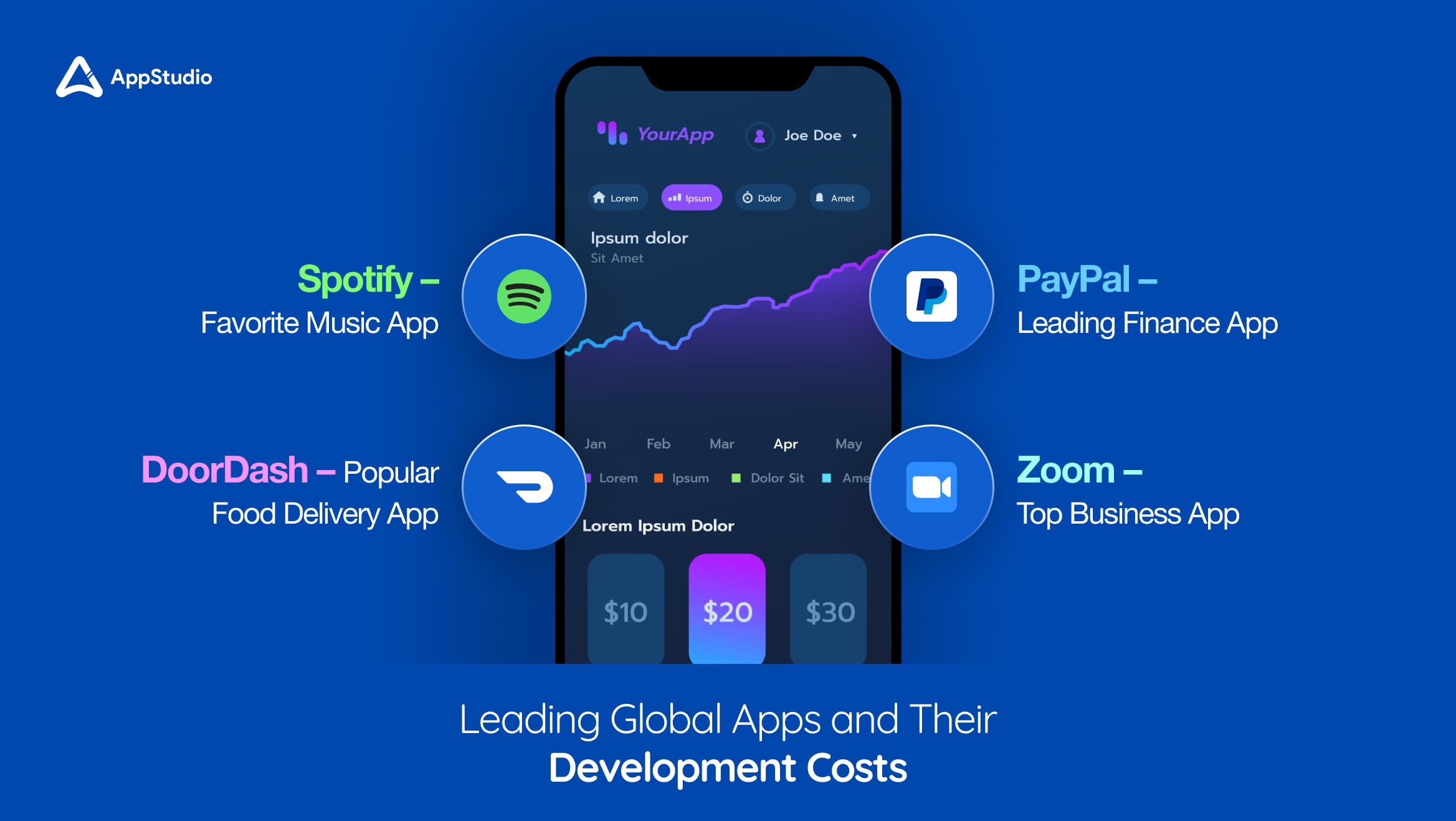
Here’s an examination of key global apps that have significantly influenced user experiences across various sectors, along with insights into their development costs based on complexity, functionality, and design:
- PayPal – Leading Finance App: As one of the top finance apps, PayPal facilitates transactions independent of traditional banking systems, incorporating features like a digital wallet and payment processing. The development of a finance app like PayPal can range from $150,000 to $300,000+, depending on the complexity and the features included.
- Zoom – Top Business App: Zoom dominates the video conferencing market, providing cloud-based meetings, screen sharing, and real-time communication features. The costs of building a business communication app like Zoom can vary from $30,000 to $200,000, influenced by the chosen functionalities and design elements.
- Spotify – Favorite Music App: Spotify leads in digital music services, offering access to a vast library of songs, podcasts, and videos. Depending on the app’s features and user interface, developing a music streaming app like Spotify for multiple platforms may cost between $45,000 and $250,000.
- DoorDash – Popular Food Delivery App: As a leading food delivery service, DoorDash connects customers with a wide range of culinary options. The cost to develop an app similar to DoorDash typically lies between $100,000 and $180,000, depending on the integration of various service features and user interface complexity.
Custom App Development: Maximizing Business Efficiency and Security
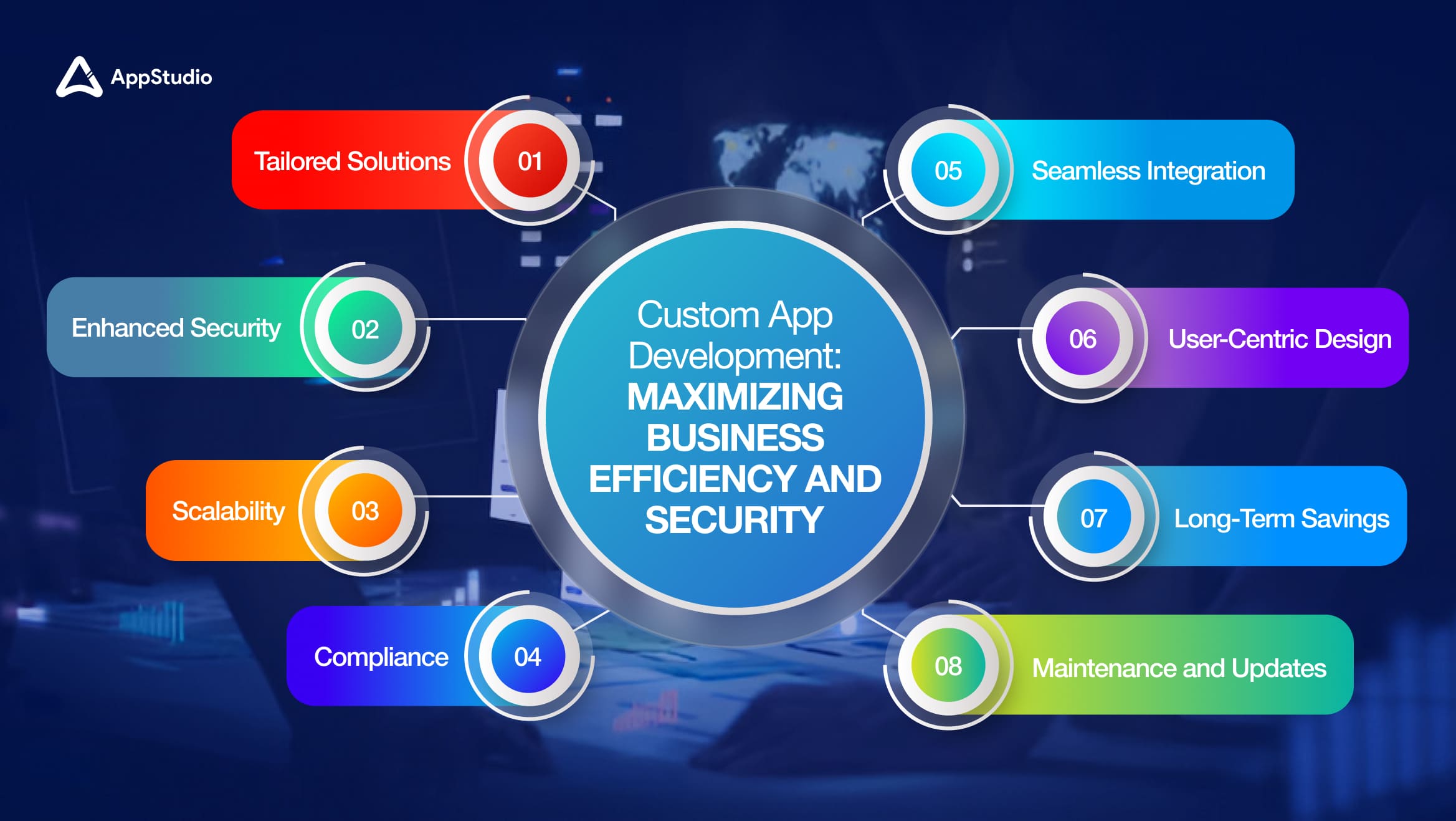
Investing in custom app development helps businesses craft solutions that meet current needs and adapt to future changes. Unlike ready-to-use software, custom apps can lead to significant savings and add value over time.
- Tailored Solutions:
Custom apps cater specifically to your business challenges and streamline operations, enhancing efficiency and productivity. This alignment reduces operational costs and speeds up time-to-market, positively impacting the cost of developing an app.
- Scalability:
Custom apps are inherently scalable and designed to grow with your business. This prevents the need for complete overhauls, optimizing the cost of an app.
- Enhanced Security:
Developed with advanced security features, custom apps safeguard sensitive business and customer data, minimizing risks and associated costs from data breaches.
- Compliance:
Custom apps ensure adherence to industry regulations, helping to avoid legal penalties and compliance issues, which can influence the average cost of developing an app.
- Seamless Integration:
The price of app development may vary depending on integration needs. Custom apps can integrate smoothly with existing business systems, reducing inefficiencies and system management costs.
- User-Centric Design:
Focusing on superior user experience increases customer satisfaction and loyalty, which can boost engagement and revenue. Personalized experiences also enhance user retention.
- Long-Term Savings:
Custom apps eliminate recurring licensing fees, making the initial investment in mobile app development cost more economical in the long run.
- Maintenance and Updates:
Custom apps are easier to maintain and update, helping to keep the software current with minimal disruption and cost.
Hidden Costs in Mobile App Development
While estimating the cost to create an app, consider these often-overlooked expenses:
- Third-Party Integrations: Services like payment systems and analytics can incur additional fees.
- Backend Infrastructure: Costs for data syncing and storage increase with cloud hosting services.
- App Store Fees: Developer fees and a cut from in-app purchases by platforms like Google Play and Apple App Store.
- Marketing and User Acquisition: Effective marketing strategies are crucial but can vary significantly in cost.
- Security and Compliance: Investments in data protection, such as encryption and security audits, are critical but can increase overall expenses.
How to Minimize Mobile App Development Costs
Creating a mobile app is a substantial investment, but there are effective strategies to manage and minimize costs while maintaining high quality and functionality. With careful planning and strategic decision-making, you can make the development process more cost-effective. Here are some actionable steps to lower the cost of app development:
- Establish Clear Requirements : Define your app’s purpose, target audience, and essential features. A well-defined project scope and detailed requirements can help prevent unnecessary changes and scope creep during the development phase.
- Focus on Core Features : Start with a Minimum Viable Product (MVP) that includes only the most critical features. This approach allows you to test the market response and gather user feedback before investing in additional functionalities.
- Adopt the Appropriate Development Approach : Utilize cross-platform frameworks such as React Native or Flutter development, which enable you to create applications for both iOS and Android simultaneously, saving time and money compared to developing separate native apps. Using open-source components can also speed up the development process and cut costs.
- Prioritize Design and User Experience : Investing in a streamlined and intuitive design from the start can prevent the need for costly redesigns later. Utilizing wireframes and prototypes before development begins can help you foresee and address potential design issues early on.
- Utilize Cost-Effective Development Teams : Consider hiring offshore or nearshore development teams from regions with lower labor costs, such as Eastern Europe, without compromising expertise. Ensure your partner has a solid reputation and effective communication practices to mitigate outsourcing risks.
- Implement Continuous Testing and Feedback : Integrate ongoing testing and user feedback throughout development. Early detection of defects can significantly reduce the costs related to fixing bugs later. This continuous loop ensures the product aligns with user expectations and performs well.
- Design with Scalability in Mind : Developing with scalability as a focus allows for easier updates and expansion. A scalable app architecture and modular design prevent the need for extensive overhauls as your app grows.
- Maintain Rigorous Project Management : Apply robust project management techniques, such as agile methodologies, to control the development timeline and budget. Consistent communication and updates with your development team can prevent misalignments and resolve issues promptly.
How Appstudio Can Transform Your App Idea into Reality
Wondering about the cost of creating an app? It’s clear that predicting an exact price is challenging due to the myriad of factors that influence app development costs. However, a comprehensive evaluation of these factors can guide you toward a more accurate estimation for bringing your unique app concept to life.
If you find yourself overwhelmed by the complexity of calculating the final cost of mobile app development, consider turning to us at Appstudio. We are a certified mobile app development company recognized for our commitment to cutting-edge software design and development. With our extensive experience and innovative approach, we provide top-notch mobile app development services that cater to your specific needs.
Whether you’re looking to integrate the latest technologies or require a custom solution tailored to your market, our team of experts is equipped to deliver excellence. To learn more about how we can transform your app idea into reality, visit Appstudio and explore our diverse range of services.
Related reading: Top 8 Omissions to Avoid During Mobile App Development
Wrapping up
In conclusion, navigating the intricacies of mobile app development costs is crucial for successfully transforming your innovative app ideas into functional realities. Given the array of factors influencing the overall expenses—from design complexities to integration needs—it’s essential to approach cost estimation comprehensively. Partnering with experienced professionals can simplify this process, providing the expertise and insights needed to tailor effective and economically viable solutions. By embracing a well-informed development strategy, you can ensure your app meets current user demands and adapts seamlessly to future growth and technological advancements.
Frequently Asked Questions
The cost of developing an app with Appstudio varies depending on the app’s complexity, chosen platform, and specific features required. Projects typically start around $20,000 and can go upwards depending on your needs and specifications.
Key factors include:
- The app’s complexity.
- The platforms it will run on (iOS, Android, or both).
- The design’s sophistication.
- The development team’s geographical location.
Each of these can significantly affect the final cost.
Appstudio effectively manages the app development budget by utilizing efficient project management, reusing code, and providing scalable solutions that evolve with your business needs. This strategy ensures development is cost-effective while maintaining high quality.
The app development cost breakdown shows that costs can vary widely, starting at $5,000 for simple apps with basic functionalities and escalating to over $300,000 for high-end, feature-rich applications, depending on their complexity and design requirements.
Choosing between native, cross-platform, or hybrid options can impact the cost. Native development might be pricier due to its optimized performance and platform-specific features, while cross-platform solutions might offer cost savings through shared code across iOS and Android.
Appstudio maintains transparent communication throughout development to manage and mitigate unexpected costs. Regular updates and staged deliverables help ensure the project stays within budget and promptly addresses any potential overruns.
